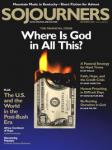In Disciples of the Street, Eric Gutierrez weaves three storylines into a narrative about the role of hip-hop in Christian ministry. The accounts are intriguing: One examines the dynamics of introducing hip-hop music into the life of an elderly Episcopalian parish, another tells the stories of hip-hop pioneer Kurtis Blow and Episcopal priest Father Timothy Holder, and the last thread explores cross-cultural ministry.
The dominant narrative begins in 2001 when Father Holder, a priest with a syrupy Southern drawl, relocates to Trinity Episcopal Church of Morrisania in the South Bronx. The parish is in transition. Father Wendall Roberts, shepherd of Trinity for 40 years, has recently died and attendance is declining.
Trinity also suffers from an identity crisis. Trinity Avenue—a street that symbolizes the surrounding neighborhood in the book—has transitioned from a predominantly white neighborhood into an Afro-Caribbean one. The demographic shift leaves Trinity Church confused about its target audience. Furthermore, as Gutierrez writes, Trinity Church disengages from Trinity Avenue like “two rivals refusing to give each other proper respect.”
Holder steps into this situation with unexpected vigor and an equally unexpected plan. He begins outreach efforts to Forest Houses, a public housing complex across the street from the church. The rector’s plan stems from a conversation with a bishop on staff at Trinity Church. Troubled by a recent siege at Forest Houses, Holder wonders: “Are we legitimate? Are we doing any good here?” These questions lead Holder into a movie theater to watch a documentary on the late hip-hop artist Tupac Shakur. Holder sits perplexed as he realizes how little he knows about hip-hop—and the Trinity Avenue that is shaped by it.
Determined to penetrate hip-hop culture, and thereby connect the youth of Trinity Avenue with Trinity Church, Holder and a group of hip-hop pioneers organize a worship service. The service, which would become the HipHopEMass, offers rich variety: Holder’s passionate prayers, Episcopalian liturgy, a remixed version of Psalm 23, and original rap lyrics. With this foundational description of the HipHopEMass set, Gutierrez then explores the challenges of combining church traditions with hip-hop sensibility, the difficulty of articulating Christian theology in entertaining ways, and the varying responses of local faith communities to Holder’s rap-meets-religion service.
IT TAKES GUTIERREZ, a teacher at the California Institute of the Arts in Los Angeles, a while to paint the backdrop of Trinity Church and Trinity Avenue, but his considerable talents surface as the story progresses. In particular, his moving account of the HipHopEMass service in a Virginia juvenile detention center subtly argues that any ministry this effective must indeed be infused with the Spirit of God.
As compelling as the dominant narrative is, the three subplots are even better. Pastors and scholars will appreciate the author’s nuanced portrayal of why the elders of Trinity Church express disagreement about the role of hip-hop in the parish. The text also sparkles when Gutierrez narrates the redemption of Kurtis Blow and Father Holder. Using the two men as foils, Gutierrez explores how hip-hop ministry helped a theologically conservative rapper-turned-preacher labor alongside a theologically liberal gay Episcopal priest. Perhaps most powerful, however, is Gutierrez’ claim that Christian ministry can be authentic and cross-cultural. The book movingly portrays the mutual ministry between the white Father Holder and the predominantly black Trinity Avenue.
Disciples of the Street is a compelling treatment of the intersection of hip-hop and Christian ministry. I strongly urge those who are interested in popular music and Christianity to read Gutierrez’ engaging work.
Andrew Wilkes, a former Sojourners summer intern, is pursuing a master’s degree at Princeton Theological Seminary.

Got something to say about what you're reading? We value your feedback!